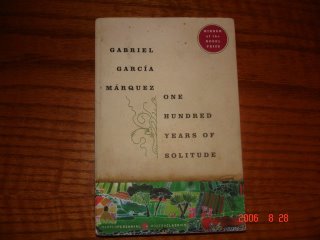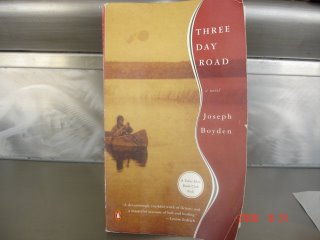One Hundred Years of Solitude *****
 One Hundred Years of Solitude by Gabriel Garcia Marquez
One Hundred Years of Solitude by Gabriel Garcia MarquezThere are some remarkable opening sentences to a novel – “They were the best of times, they were the worst of times”. The opening sentence in Gabriel Garcia Marquez’s novel “Many years later, as he faced the firing squad, Colonel Aureliano Buendia was to remember that distant afternoon when his father took him to discover ice.”, seduces the reader like a linguistic perfume that lies somewhere between intoxication and addiction. On page 18 “he (sic. Aureliano) paid another five reales and with his hand on the cake (sic. Ice) as if giving testimony on the holy scriptures he exclaimed, “This is the greatest invention of all time.” Who, as a reader, could ever imagine that the word “ice” would entice you to read an entire novel?
There is a kind of literary rush from being exposed to such descriptions as: “He had wept in his mother’s womb and was born with is eyes open.” (p14) An example of simplicity taken to such an extreme it is profound.
Some sentences (p. 16) which are a paragraph in length (and still appear to be grammatically correct) are filled with such captivating imagery that one does not want to reach the end of the sentence.
“It was a simple way of giving herself some relief, because they were joined till death by a bond more solid than love: a common prick conscience.” One only has to look into one’s heart to appreciate the disturbing implications of such a revelation.
See last sentence on page 27 (which is 16 lines long) for the magic of the potential simplicity of compound, complex, multifaceted, multifarious, intricate sentences. “…because he did not know where is feet were his feet were or where is head was, or whose feet or whose head, or he could no longer resist the glacial rumblings of his kidneys and the air of his intestines, and fear, and the bewildered anxiety to flee and at the same time stay forever in that exasperated silence and that fearful solitude." Can there be any language that is more hypnotic? Many pages so captivating that I read them again to see if they were that real
“Because that woman, whose explosive laugh frightened off the doves, had nothing to do with the invisible power that taught him how to breath from within and control his heartbeat, and that had permitted him to understand why men are afraid of death.” (p 28)
This testimony is not only of the transition from boy to man but in a broader context the transition from the blindness of youth to the starkness of adults. Fear of death is only a concept. At some point in life it becomes more than a concept, it becomes a reality. At that point the child within is only a shadow, and can only be resurrected through the confrontation with the realism of the unknowable.
I desperately wish that I knew the Spanish language so that I could read the original version. However, the translation by, Gregory Rabassa, is remarkable. A captivating vocabulary and exquisite use imagery that one can only envision is charismatic restatement of the romance of the original Spanish.
The novel relates three generations of a family that exposes the, the solitude of politics, the solitude of youth, the solitude of aging, the solitude of creativity, the solitude of war, the solitude of warrior, the solitude of sanity and of insanity, the solitude of beauty, the solitude of leadership, the solitude of nostalgia, the solitude of progress, the solitude of loneliness, the solitude of love. If there is a resolution to solitude (and there probably is not) it may be capture on page 169…”He had had to start thirty two wars and had to violate all of his pacts with death and wallow like a hog in the dung heap of glory in order to discover the privileges of simplicity almost forty years late.”
Many time during the reading of the book I felt that I was too ignorant to understand it. The material metaphorically portrayed some real events in South American history of which I was not aware. Notwithstanding this feeling of ineptitude the majesty of the language, the writing and the miraculously creative imagery hypnotized me. A friend of mine, named Bill, told me before I read it “that you can read this books many times and still not be certain that you understand it.”
Read the book without interruption. It is not a book you can set down and pick up later and remember what was happening.
The phenomenal writing requires total constant attention to maintain and appreciation for the characters and the non-linear exposition of chronology of what is memorable? To appreciate the book at the highest ethereal level it may be best achieved when you read it without paying attention to the details, without trying to analyze but, instead, to immerse yourself in the mysteries of the unexplainable combination of mysticism and history…a book that exploits the mysteries of the soul, the miracles of the paranormal and is so immersed in earthly matters that the issues of spiritually remain with the invisibility of the “human soul” which only perpetuates the confusion achieved through combining the real with the denial of the “possibly” real and the proof that it exists (maybe).
Make love to this book with your eyes: make love to this book with your mind: make love to this book with your hands (unless you are reading a copy from the public library): make love to this book with you uninhibited imagination.
An astounding vocabulary…a confession – on many pages I was confronted by a concept embedded in linguistic disguise that I did not recognize.


